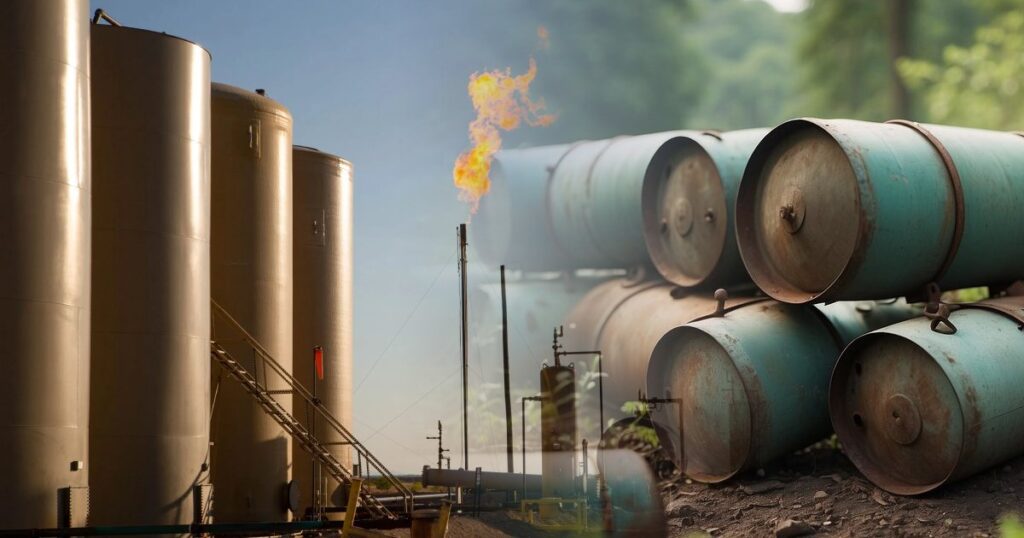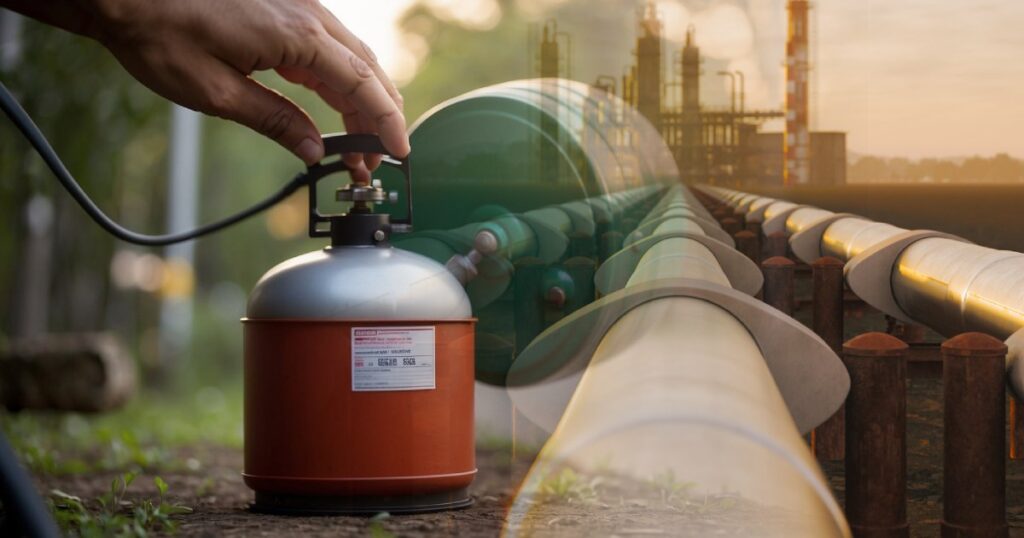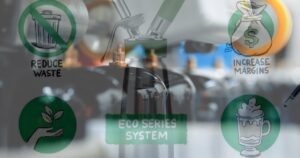Gas Cylinder Environmental Impact: Understanding the Eco-Consequences
FastGas Blog
Gas cylinders are common in various settings, from campgrounds to industrial facilities, filled predominantly with liquefied petroleum gas (LPG), a non-renewable resource. When gas from these cylinders is burned for energy, it inevitably contributes to greenhouse gas emissions, releasing carbon dioxide (CO2), nitrogen oxides (NOx), and potentially other pollutants. These emissions have a cascading effect on the environment, contributing to climate change and air quality. Throughout this article on gas cylinder environmental impact, you will learn more.
However, it’s important to understand that not all gases and cylinders have the same level of impact. Innovations in cylinder production and the gases used, such as those by Fast-Gas, aim to reduce environmental harm. The use of more sustainable materials in cylinders and cleaner combustion gases are steps towards mitigating the footprint of gas use. Additionally, the disposal and recycling of gas cylinders are critical factors in minimising their environmental impact. Proper handling can prevent harm to ecosystems and facilitate materials reclamation, aligning with a more circular economy.
Key Takeaways
- Gas cylinders, while useful, contribute to greenhouse gas emissions and climate change.
- Advances in-cylinder technology and alternative gases offer pathways to reduce environmental impact.
- Responsible disposal and recycling practices are essential for mitigating harm to the environment.
Environmental Impact of Gas Cylinders
Gas cylinders play a crucial role in various industries and everyday applications, but their production, usage, and disposal can have notable environmental impacts that you should be aware of.
Impact on Climate Change
Gas cylinders often contain substances like refrigerants, LPG, and other gases that can potentially contribute to climate change when leaked into the atmosphere. Refrigerants, for example, can have a high global warming potential (GWP), and their accidental release contributes to greenhouse gas emissions. LPG, while considered a cleaner fossil fuel, is primarily composed of propane and butane, which are by-products of natural gas processing and crude oil refining. Leaks or improper combustion of these gases can release carbon dioxide and methane, exacerbating global warming.
Air Quality and Pollution
The use and handling of gas cylinders can impact air quality significantly. Emissions from the combustion of fossil fuels like coal and natural gas can lead to the release of pollutants such as nitrogen oxides, carbon monoxide, and particulate matter, which degrade air quality and pose risks to public health. Mismanaged cylinders may also release volatile organic compounds (VOCs) that contribute to the formation of ground-level ozone, a key component of smog.
Gas Cylinder Life Cycle and Emissions
From manufacturing to disposal, gas cylinders have a life cycle that contributes to emissions. The production stage involves energy-intensive processes, often reliant on fossil fuels, leading to CO2 emissions. At the end of their life cycle, improper disposal can result in the release of residual gases. Fast-Gas, for instance, takes these factors into account, aiming to reduce emissions throughout the cylinder life cycle by implementing eco-friendly initiatives.
- Manufacturing: Energy requirements often derive from fossil fuels.
- Distribution: Emissions during transportation.
- Usage: Potential leaks and energy consumed.
- Disposal: Risk of gas release and recycling possibilities.
Safety and Handling Considerations
Your safety and the environment’s health are interlinked when it comes to handling gas cylinders. It is essential to follow safety guidelines outlined in safety data sheets for the specific material contained within the cylinders. Proper storage and regular checks for leaks not only ensure safe operations but also prevent the escape of potentially toxic substances and greenhouse gases into the atmosphere. Fast-Gas underscores the importance of detailed safety measures to minimise the risk of cylinder-related accidents and emissions.
Mitigation and Alternatives
In addressing the environmental impact of gas cylinders, you’ll find that industry leaders like Fast-Gas heavily invest in eco-friendly initiatives. These innovations and policies are key to mitigating climate change and promoting sustainable energy sources.
Advancements in Gas Cylinder Technologies
Fast-Gas is at the forefront of developing technology that reduces the environmental footprint of gas cylinders. With a focus on reducing methane emissions, they are designing cylinders that ensure fewer leaks and offer better insulation. This decreases the greenhouse gas emissions associated with using natural gas, particularly from sources like LPG and refrigeration systems.
Regulations and Environmental Policies
You will notice that regulatory bodies such as the Environmental Protection Agency (EPA) are setting stringent guidelines to curb emissions in the oil and gas industry. Policies stemming from globally recognised agreements, like the Paris Agreement, lay the consensus for carbon neutrality, demanding higher standards for methane emissions control and encouraging the transition to renewable energy.
Sustainable Energy Systems
When considering sustainability, the shift towards energy systems that integrate renewables such as solar and wind into electricity production is evident. Companies are exploring the use of hydrogen as a cleaner alternative, leveraging natural gas wells and fracking techniques that are more efficient and environmentally friendly.
Recovery, Recycling, and Disposal
Your attention to the end-of-life phase of gas cylinders is crucial. Enhanced collection and recycling practices lead to better disposal methods. By promoting a recycling culture within the industry, Fast-Gas supports the recovery of materials, ensuring they are reintegrated into the production cycle or safely disposed of, thus significantly reducing environmental impact.
Frequently Asked Questions
This section addresses common concerns regarding the environmental impact of gas cylinders, specifically focusing on pollution contribution, effects on the environment, comparison between fuels, and disposal methods.
How do compressed gas cylinders contribute to environmental pollution?
Compressed gas cylinders can contribute to environmental pollution if they are not handled or disposed of properly. Leaks and emissions from these cylinders release various pollutants into the atmosphere, which can contribute to air quality degradation and adverse health effects.
What are the harmful effects of LPG on the environment?
Liquefied petroleum gas (LPG) is a hydrocarbon fuel and can release carbon dioxide and other pollutants when burned. Although LPG combustion is cleaner compared to some other fossil fuels, it still contributes to the greenhouse gas emissions that drive climate change.
Comparatively, which is less harmful to the environment, LPG or petrol?
LPG is often considered less harmful to the environment than petrol; it generally burns more cleanly, with fewer carbon emissions, particulate matter, and nitrogen oxides. However, the environmental impact of both fuels also depends on the efficiency of the technology used for combustion and the management of the entire fuel life cycle.
What is the best method for disposing of gas cylinders in the UK?
In the UK, the best method for disposing of gas cylinders is to return them to the supplier, as many suppliers operate take-back schemes. It’s important not to dispose of gas cylinders with general waste or recycling due to their potential hazard.
How should one properly dispose of old or unused oxygen cylinders?
You should return old or unused oxygen cylinders to the supplier or a licensed waste disposal facility. Ensure that the cylinders are empty and there is no pressure inside before replacing them to avoid any safety risks during transport or handling.
In what ways does the production of gas impact the environment?
Gas production impacts the environment throughout its life cycle, from extraction to processing and distribution. It involves energy-intensive processes which may lead to habitat disruption, water consumption, and emissions of greenhouse gases and other pollutants. Production methods vary in efficiency and environmental footprint. Fast-Gas, for instance, implements eco-friendly initiatives to minimise the environmental impact of their production processes.






